Serving 99 students in grades 7-12, City Academy ranks in the bottom 50% of all schools in Utah for overall test scores (math proficiency is bottom 50%, and reading proficiency is bottom 50%).
The percentage of students achieving proficiency in math is 11-19% (which is lower than the Utah state average of 39%). The percentage of students achieving proficiency in reading/language arts is 20-29% (which is lower than the Utah state average of 43%).
The student:teacher ratio of 8:1 is lower than the Utah state level of 21:1.
Minority enrollment is 62% of the student body (majority Hispanic), which is higher than the Utah state average of 29% (majority Hispanic).
Quick Stats (2025)
- School Type: Charter School
- Grades: 7-12
- Enrollment: 99 students
- Student:Teacher Ratio: 8:1
- Minority Enrollment: 62%
- Graduation Rate: ≥80% (Btm 50% in UT)
- Overall Testing Rank: Bottom 50%
- Math Proficiency: 11-19% (Btm 50%)
- Reading Proficiency: 20-29% (Btm 50%)
- Science Proficiency: 20-29% (Btm 50%)
- Source: National Center for Education Statistics (NCES), UT Dept. of Education
Top Rankings
City Academy ranks among the top 20% of public schools in Utah for:
Category
Attribute
Diversity
Community Size
Student Attention
School Overview
City Academy's student population of 99 students has declined by 39% over five school years.
The teacher population of 13 teachers has declined by 23% over five school years.
School Type
Grades Offered
Grades 7-12
Total Students
99 students
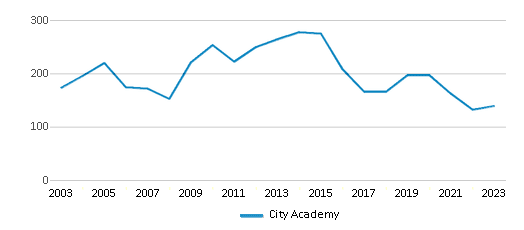
Gender %
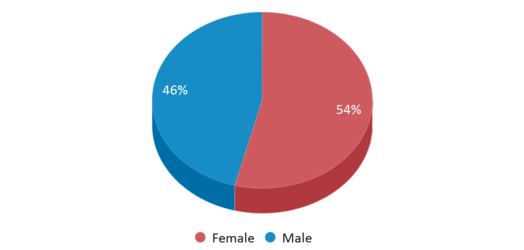
Total Classroom Teachers
13 teachers
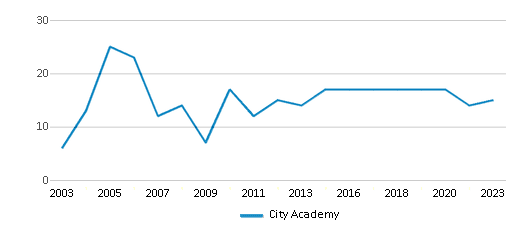
Students by Grade
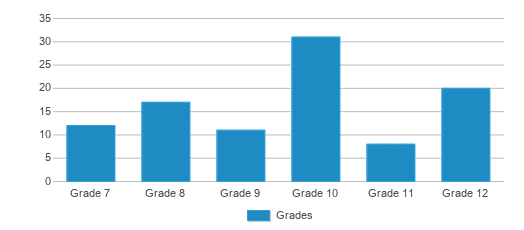
School Rankings
City Academy ranks within the bottom 50% of all 975 schools in Utah (based off of combined math and reading proficiency testing data).
The diversity score of City Academy is 0.63, which is more than the diversity score at state average of 0.46. The school's diversity has stayed relatively flat over five school years.
Overall Testing Rank
#896 out of 975 schools
(Bottom 50%)
(Bottom 50%)
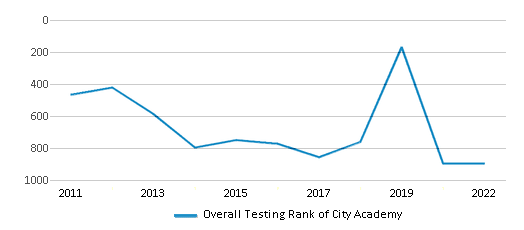
Math Test Scores (% Proficient)
(20-21)11-19%
39%
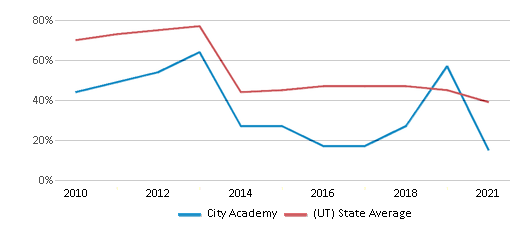
Reading/Language Arts Test Scores (% Proficient)
(20-21)20-29%
43%
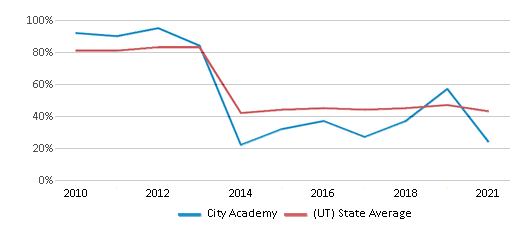
Science Test Scores (% Proficient)
(20-21)20-29%
45%
Student : Teacher Ratio
8:1
21:1
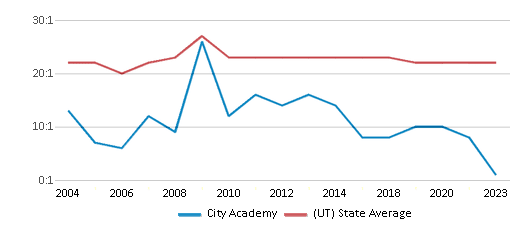
American Indian
1%
1%
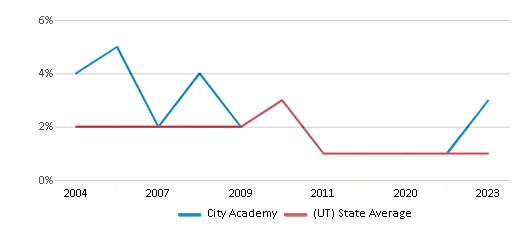
Asian
5%
2%
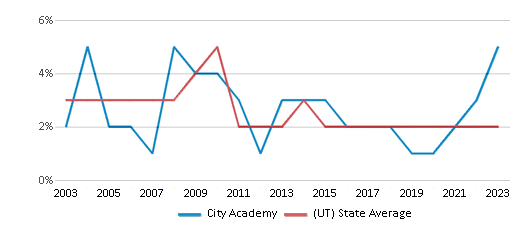
Hispanic
48%
20%
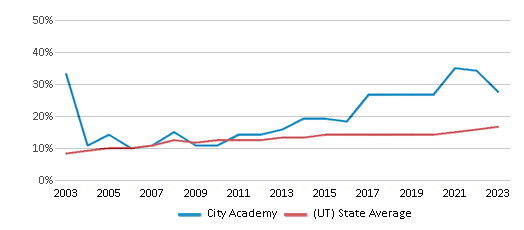
Black
3%
1%
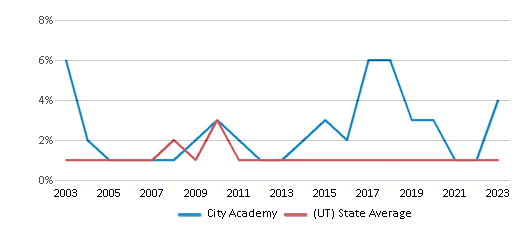
White
38%
71%
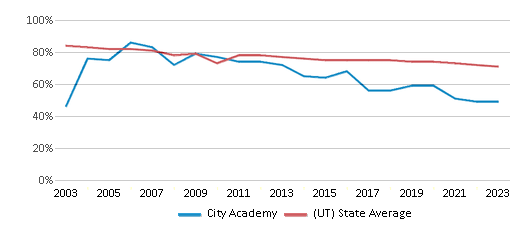
Hawaiian
n/a
1%
Two or more races
5%
4%
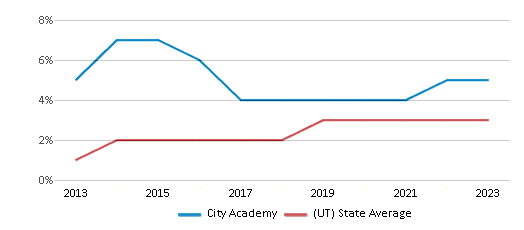
All Ethnic Groups
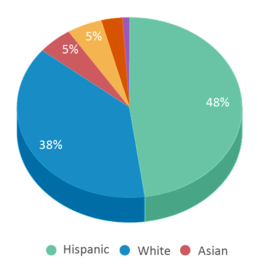
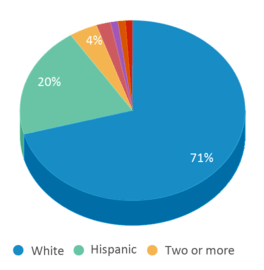
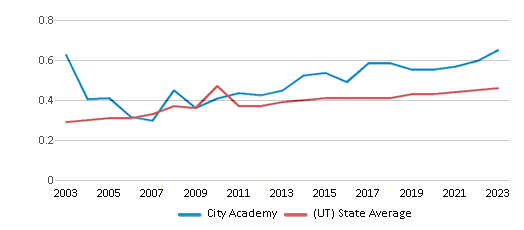
Graduation Rate
≥80%
88%
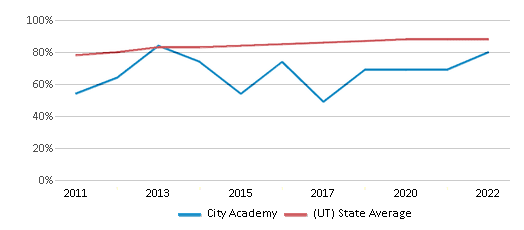
Eligible for Free Lunch
47%
24%
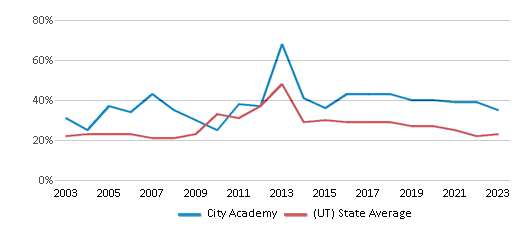
Eligible for Reduced Lunch
11%
6%
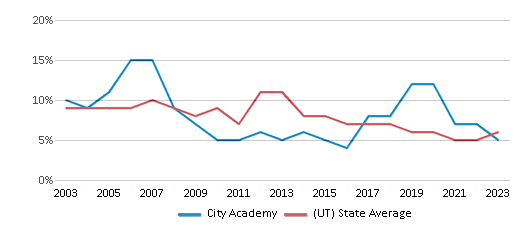
School Statewide Testing
School District Name
Source: National Center for Education Statistics (NCES), UT Dept. of Education
Profile last updated: 02/09/2025
Frequently Asked Questions
What is City Academy's ranking?
City Academy is ranked #896 out of 975 schools, which ranks it among the bottom 50% of public schools in Utah.
What percent of students have achieved state testing proficiency in math and reading?
11-19% of students have achieved math proficiency (compared to the 39% UT state average), while 20-29% of students have achieved reading proficiency (compared to the 43% UT state average).
What is the graduation rate of City Academy?
The graduation rate of City Academy is 80%, which is lower than the Utah state average of 88%.
How many students attend City Academy?
99 students attend City Academy.
What is the racial composition of the student body?
48% of City Academy students are Hispanic, 38% of students are White, 5% of students are Asian, 5% of students are Two or more races, 3% of students are Black, and 1% of students are American Indian.
What is the student:teacher ratio of City Academy?
City Academy has a student ration of 8:1, which is lower than the Utah state average of 21:1.
What grades does City Academy offer ?
City Academy offers enrollment in grades 7-12
What school district is City Academy part of?
City Academy is part of City Academy School District.
In what neighborhood is City Academy located?
City Academy is located in the Central City neighborhood of Salt Lake City, UT. There are 3 other public schools located in Central City.
School Reviews
5 4/9/2022
I am so thankful that I was able to attend City Academy in high school. Due to the small class sizes, I was able to receive individualized attention from each teacher, helping me to be successful throughout my schooling. Awesome teachers and small class sizes were the best fit for my education.
1 5/2/2017
As a parent of a child who attended City for two years, I would caution any parent considering City. They have a revolving door of teachers, uncaring administration, and cannot individualize education in any way for your child. We have gone back to public school after City and are finding many more opportunities for our child and much more help.
5 4/7/2017
It was a different school in 2011, now it has changed drastically. I went to West High before, where I was bullied and ridiculed, but at City the teachers care. The students rarely pick on one another now. It feels like home when I walk in the doors. They all want you to succeed, unlike other schools. The music program is amazing, as is the theatre program. Our STEM programs are outstanding. We may be little, but this school is fierce!
5 4/7/2017
This school saved my life! I came from a big school, and it ruined me. Made me a shell of a human. City Academy has undergone some serious changes, including firing and hiring new staff members, tweaking the rules, and becoming more involved. The school is amazing, and I recommend it to everyone!
2 10/17/2011
I attended this school for 4 years. Now that I am out of school and trying to find a job, I see how bad an experience this school was for me. It is a disaster!
Review City Academy. Reviews should be a few sentences in length. Please include any comments on:
- Quality of academic programs, teachers, and facilities
- Availability of music, art, sports and other extracurricular activities
Recent Articles

What Is A Charter School?
Explore the world of charter schools in this comprehensive guide. Learn about their history, how they operate, and the pros and cons of this educational innovation. Discover key facts about charter schools, including admission policies, demographics, and funding, as well as what to look for when considering a charter school for your child.

10 Reasons Why High School Sports Benefit Students
Discover the 10 compelling reasons why high school sports are beneficial for students. This comprehensive article explores how athletics enhance academic performance, foster personal growth, and develop crucial life skills. From improved fitness and time management to leadership development and community representation, learn why participating in high school sports can be a game-changer for students' overall success and well-being.

February 05, 2025
Understanding the U.S. Department of Education: Structure, Impact, and EvolutionWe explore how the Department of Education shapes American education, from its cabinet-level leadership to its impact on millions of students, written for general audiences seeking clarity on this vital institution.

























